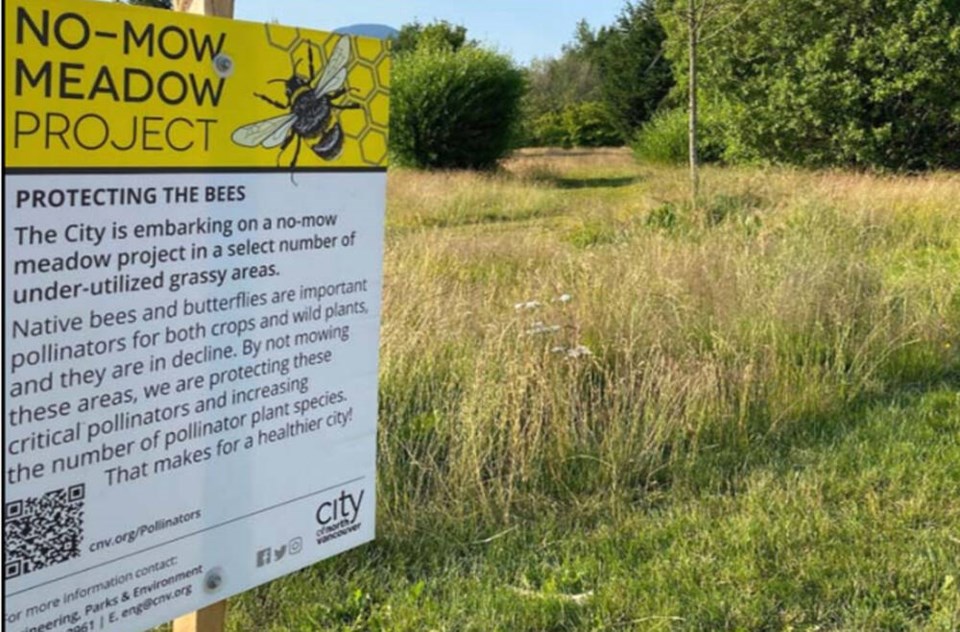The City of North Vancouver will continue to lay off the lawnmowing in some parks to make room for pollinator-friendly “urban meadows.” But council has swatted down a proposal to greatly expand the low-mow pilot project.
There has been a growing movement away from manicured lawns, with landowners and governments opting instead for more natural spaces that are a boon to biodiversity and also help the soil retain moisture and cooler temperatures. Starting in 2023, the city experimented with 0.7 hectares of low-mow sections of Grand Boulevard and East Keith Boulevard. Under the pilot, the designated areas were only mowed once in the spring and once more in the fall, and city staff seeded the area with native wildflowers.
The pilot follows a similar one in the City of Vancouver, which has 110 meadow sites covering 41 hectares of land. Studies in Vancouver have confirmed significant growth in the number of bees and other insects in low-mow areas.
City of North Vancouver staff came to Monday’s meeting with a proposal that would have greatly expanded the current pilot project, transitioning 3.7 more hectares of manicured lawns in existing park and boulevard space to urban meadows. The proposal included 30 to 40 per cent of park space on Grand Boulevard (although no space on the 1300 and 1400 blocks), West Keith Boulevard, the Spirit Trail, Mahon Park and Kingsmill Walk Park. Had council approved the expanded pilot, it would have been more than a six-fold increase in the amount of urban meadow, bringing the total to three per cent of the city’s park space.
But, the majority on council wasn’t sweet on the idea of adding so much more pollinator space, with some saying they still felt a bit stung by blowback from members of the public who didn’t appreciate the 2023 pilot.
Coun. Don Bell moved to have the current pilot project continue but hold off on considering any further expansion until 2025.
With the city densifying, public parks are becoming the “backyards” of the city, and the spaces should be reserved for recreation, Bell argued.
“The impact on places like Grand Boulevard I think are significant in terms of the amount of the number of people I see using it,” he said, suggesting that city staff look to urban greenspaces that aren’t in parks for more urban meadows.
Coun. Holly Back voted to continue the pilot but she also listed numerous concerns, including inflaming residents’ allergies, attracting other less friendly insects and the risk of brush fires. Mostly though, Back said residents in Grand Boulevard did not like the esthetic change.
“I got lots of negative comments saying ‘What the hell is the city doing? Has everyone quit work?’” she said. “It just looks so messy, almost like it gives people permission to drop their garbage and that garbage is not getting picked up.”
Others on council took a rosier view of the urban meadows, but still weren’t prepared to see the project grow so quickly.
Mayor Linda Buchanan said she preferred taking a balanced approach, keeping the pilot going while giving the public more time to adjust.
“I would really like staff to be focused on getting us back to what people in our community were used to, recognizing that we do have some changes that we are making and how do we bring people along?”
Coun.Jessica McIlroy successfully lobbied to have a small section of Mahon Park included in the program in 2024.
“I think it’s actually important for us to start to demonstrate that we need a cultural shift away from manicured lawns,” she said. “This actually is not primarily about bees. There are so many other things and I think for us, it’s actually really important to consider it as green infrastructure.”
Coun. Tony Valente’s was the lone vote against the scaled back pilot. Valente told his fellow council members they should be a bit bolder when it comes to climate action.
“I do think we need to move faster,” he said. “I do think that it is really important we start to show some visible changes in our community about how we are adapting.”


